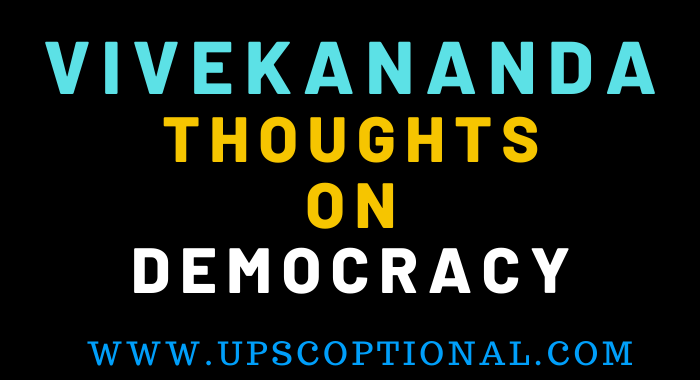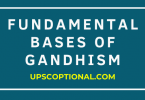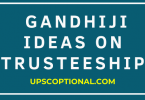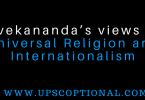Discuss in brief Vivekananda’s concept [ thoughts ] of Democracy.
Vivekananda’s plea for the individual initiative and social equality made him a firm believer in the institutions of democracy. The liberation of the masses, involved in the concept of social equality, necessitates their participation in the activities of the government. He came to believe that some form of the government by the people is in the offing and pointed out with certainty that the future belongs to the masses, Shudras.
Thus he identified the Shudras rule with democracy. By Shrudras rule, he certainly meant the rule of the masses and not the rule of a particular section of the society. And by democracy, he meant not representative or indirect democracy, as it is current today. It was the man-making process; it inculcates faith in self reliance and self government. It brings out the latent abilities of the individual into full play to shoulder the responsibilities of government.
In other words, it makes the individual ethical, social and spiritual. But the man-making process is only to Vivekananda, and the end is the realisation of the ideal of Brahmin which is the embodiment of self restraint, renunciation and selfless activity.
Vivekananda’s viewed democracy both as a way of life and a form of government. As a way of life, democracy envisages freedom, equality and brotherhood and their union. Vivekananda’s faith in the inability of freedom, equality and unity made him espouse democracy as a way of life. Speaking on democracy as a form of government, he maintained that social evolution was possible through the cyclical rule of the caste system.
The cyclical caste rule provided the theory of forms of government, namely the Brahmin, the Kshatriya, Vaishya and Shudra. He was of the view that forms of government were evolutionary, and not based on individual whims and fancies. He praised the Brahmin rule for its accumulation of spiritual lore, the Kshatriya for promoting science and civilization and the Vaishyas for forging international contacts.
He made it clear that all these forms of caste rule in course of time became degenerated and estranged from the bulk of the population who constituted the main source of power in all forms of caste rule. The cyclical replacement of Vaishya ultimately paves in all forms of caste rule of Shudra. Vivekananda identified the rise of Shudras with democracy, and he became their votary.
He pointed out that everything goes to show that some form of rule by the people, call it what you will is coming on the board. He was an ardent defender of democracy because he was against the rule of one or the few. He strongly believed that the new order of things is for the rule of one or the few. He made it clear that in all forms of government that ultimate source of power is always the subject masses. The government of the people and by the people, could provide an opportunity for them to uplift themselves and mould their future.
He believed that democracy encouraged individual initiative and self reliance in administering the affairs of the government. From this standpoint, he criticised the party system which is thought necessary today for forming the government. The philosophy of Vedanta, of which Vivekanada was a votary, is inconsistent with the present party system. Hence, to avert the evil effects of representative democracy and to strengthen, he laid emphasis on the man making process through education – sacred and secular.






